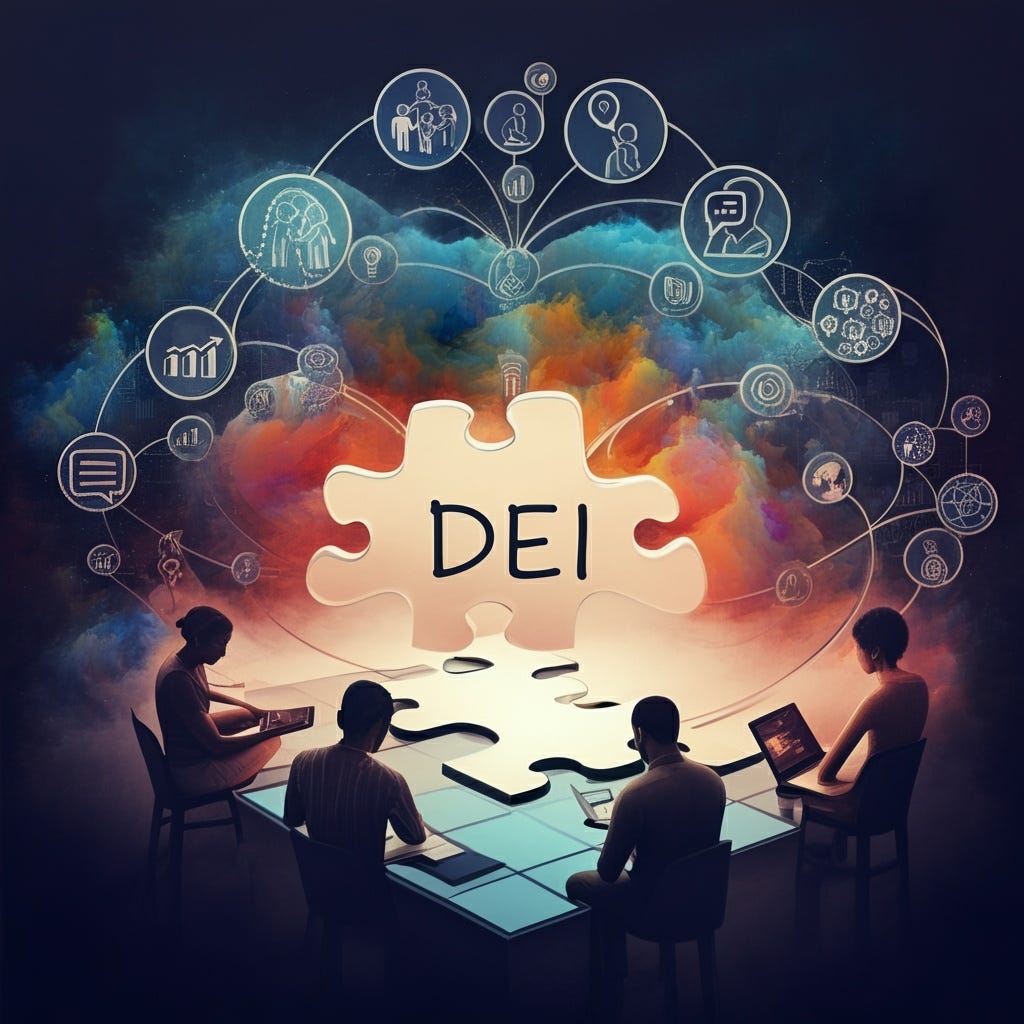The limits of DEI: anyone can abuse their power, not just white men
Lessons in professional class social dynamics
Introductory note
Grow Some Labia and I have been writing and talking about DEI, beginning with last week’s examination of how DEI might enable healthier conflict between men and women in the workplace. Here is another installment about how DEI is often not up to its task. We don’t have solutions for this thornier set of problems yet. This piece aims to help us evolve our mental power distribution model in the workplace. We’re not providing solutions here, though we will in a future installment.
i. A Consideration of Power
Diversity, equity, and inclusion (DEI) programs promise workplace fairness, but their practitioners often fundamentally misunderstand how power works. The irony, of course, is that the theoretical underpinning of DEI is supposedly an analysis of power. But worry not; I read Foucault and most other theorists involved (and it was miserable, just to be precise).
DEI has inadvertently created a moral licensing regime. By categorizing people into fixed groups of oppressors and oppressed, these frameworks paradoxically enable the very behaviors they aim to prevent. Individuals can now use their identity as a moral 'get out of jail free' card, excusing behaviors they would condemn in others.
Just as Kimberlé Crenshaw noted that black women face multifaceted discrimination, my own professional experiences reveal a more nuanced reality. My identities – working class, American, Indian-appearing, woman – intersect in ways that defy our categorical thinking.
I once thought power flowed only from white people (for real). But the experiences I will share taught me that power:
Pools in unexpected places
Can find the path of least resistance
Changes direction rapidly
DEI frameworks oversimplify workplace power dynamics by creating false binaries between oppressor and oppressed groups, leading to moral licensing that can enable discriminatory behavior from any identity group.
Before I proceed, I want to emphasize that my experiences aren’t intended to indict groups based on their identities. Instead, the experiences show that our assumptions about individual behavior based on their group identities are often incorrect. And this is precisely what progressives also argue, but from a different direction. We are at a point of convergence!
To illustrate the complexity of workplace power dynamics, consider these seemingly paradoxical scenarios:
A liberal woman discriminates against a conservative woman for having a child.
A black woman excuses my shitty behavior to white people based on my experience of ‘microaggressions.’
Indian managers with citizenship exploit other Indians on H1Bs.
An entire white male engineering team is pushed out of an Indian-dominated company.
But why did all these happen? The answer isn’t straightforwardly race or gender or national origin.
Questions for reflection:
When have you witnessed power dynamics that defied simple categorization
How might your own workplace experiences challenge established ideas?
ii. I abused my moral license
DEI frameworks can paradoxically enable the very discrimination they aim to prevent. I know because I was complicit in this system as a practitioner and someone who abused its moral licensing.
I've witnessed DEI's evolution from the inside since before it became mainstream in the 2010s. As a diversity recruiter at Google, I embodied what Musa al-Gharbi calls 'symbolic capitalism'—my role gave me social status and moral authority despite my modest salary. Though we primarily recruited white and Indian women into tech, the DEI framework primed me to see systemic injustice everywhere.
The absurdity of these frameworks became clear at my next company, where I led the 'Asian' employee resource group. We attempted to unite people from vastly different contexts under one artificial banner: immigrants from India to Japan, their Western-raised children, and employees across Asia. My main achievement as chair? A Diwali party.
I was good friends with the director of DEI, a black woman. My friendship with her gave me moral license to say things about white people casually and attribute to race what was otherwise ambiguous behavior. I once made an offhand comment about how whiteness drove a group of people to repeatedly empty meeting rooms late. I later found out they had complained to the DEI director about this, but she dismissed it. She excused it by telling them I had been the target of accumulated microaggressions, so my behavior should be hand-waved. This is why social justice culture is insidious - moral licensing enables terrible behavior. I still feel remorse about mine in this period.
This incident exemplifies how DEI frameworks can create a hierarchy of moral authority based on identity rather than addressing actual power dynamics and discriminatory behavior. My status as a woman of color gave me the license to engage in the very behavior that DEI supposedly exists to combat. I am skeptical of the moral licensing raj1 because I once deceived myself using it. And if something enables terrible behavior among its license holders, would you not question the licensing regime itself? Why are we defending something indefensible?
iii. The liberal and the conservative: a tale of two women
I derided and complained about white people when I shouldn't have attributed their behavior to race. I also enlarged the meaning of incidents to create conflict where I shouldn't have. At the same time, I also experienced abuse at the hands of a white woman: a childless San Francisco liberal. My manager, Shelly, a conservative Austin woman married to a cop, dared to have a second child while working for Cindy. Shelly had the gall to complain about unfair and unclear expectations, prompting Cindy to say, “This is why women with children don’t get ahead.”







